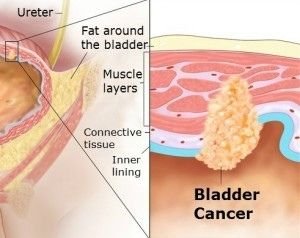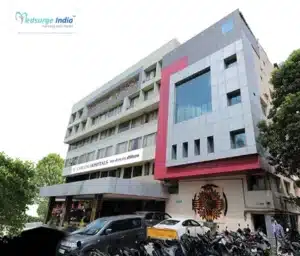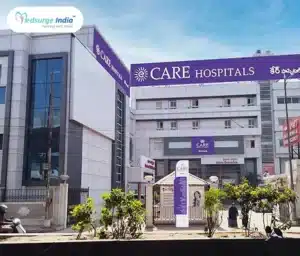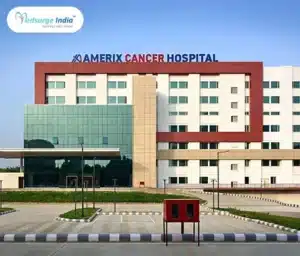Bladder Cancer Treatment Cost In India
Unlock Exclusive Discount : Your Gateway to Premium Healthcare with Medsurge India Health Value Card.

Unlock Exclusive Discount : Your Gateway to Premium Healthcare with Medsurge India Health Value Card.


The cells of the bladder are where bladder cancer, a prevalent form of cancer, starts. Located in your lower abdomen, the bladder is a hollow muscular structure where pee is stored. Bladder cancer usually originates in the cells (urothelial cells) that line the lining of your bladder. Urothelial cells are found in your kidneys as well as the ureters that join them to your bladder. Although it can occur in the kidneys and ureters as well, bladder urothelial carcinoma is significantly more prevalent.
The majority of bladder cancer cases are discovered in their early stages when they are quite curable. Even early-stage bladder tumors, nevertheless, could return after a therapeutic regimen. Because of this, bladder cancer patients frequently require follow-up exams for years following treatment to check for bladder cancer that returns.
In addition to these benefits, one of the major factors strengthening India’s reputation abroad is its ability to provide affordable bladder cancer treatment cost in India without compromising clinical standards. The price of bladder cancer treatment in India might be lower or more depending on the hospital, the doctor’s qualifications, and a number of other variables.
The bladder, located in the pelvic region, is a muscular, balloon-shaped, and hollow organ. As urine forms in the kidneys, it is stored in the bladder before it leaves the body through the urethra. Bladder cancer in the tissues of the urinary bladder refers to malignant growth/tumors.
The most common form of bladder cancer starts in the inner lining of the bladder cells (transitional cell carcinoma). The other forms include squamous cell carcinoma, in which the cancer is small, cancer starts with flat cells lining inside the bladder, and adenocarcinoma in the cells that releases mucus.
The best outcomes for bladder cancer treatment in India are offered at a very reasonable cost. India has recently emerged as a popular medical tourism destination for patients around the world who are seeking care from world-renowned doctors at highly accredited hospitals in India.
Urine Blood (Hematuria): It is the most common symptom and typically the first sign of a cancer alarm. Hematuria is usually painless and, depending on the amount of blood in the urine, the urine can appear light pink, brown or red (rarely). Blood is often not visible, and urine may seem clear, but urinalysis may find small quantities of blood (urine test). After the initial sighting, the blood can also vanish for weeks.
Changes in Urinary Pattern: Regular (more than usual) urination, burning sensation or pain when urinating, sudden urges to urinate even though the bladder is not full.
These are the early-stage symptoms of bladder cancer and can correlate with symptoms of other conditions, such as Urinary Tract Infection, Bladder Stones, Kidney Stones, or Male Prostate Enlargement. In every case, however, one must visit the doctor for a check-up.
Affordable Bladder Cancer Treatment Cost in India starts from 4000 USD to 18,000 USD. Comparatively speaking to other nations, the price of bladder cancer treatment in India is much more affordable. Additionally, the scope and quality of medical treatment and services offered are comparable to those found in the world’s top hospitals even after travel, lodging, and food costs are subtracted, Additionally, the overall cost of bladder cancer treatment in India will depend on the sort of therapy you require and the results of your examination.
Bladder Cancer Treatment cost in India can depend on the patient depends on many factors, they are:
For foreign patients traveling to India, Medsurge India provides the finest Bladder Cancer Treatment cost in India at a reasonable cost, all while being supervised by top medical professionals. Click here for the medical visa form.
There are several variables that increase the risk of a person developing bladder cancer.
Several tests and techniques are used to investigate the individual signs of bladder cancer in the urine and bladder. Such assessments for diagnosis include:
Urinalysis: A basic test conducted to examine the urine sample for blood and other substances. In the presence of certain substances such as glucose, red blood cells (RBCs), etc., this test uses chemical dipsticks that change color.
Cytology of Urine: A urine sample is examined under a microscope to search for pre-cancer or cancerous cells for this examination.
Cystoscopy: The urologist moves a cystoscope through the opening of the urethra and into the bladder to study the inner lining of the organ for this operation. A thin tube with a lens and a camera attached to it is a cystoscope. Typically, to make the operation painless and relaxing, the patient is given a local anesthetic cream, which is added to the urethra.
Biopsy: If anomalies are found during a cystoscopy, a biopsy procedure called “Transurethral Resection” of a bladder tumor is provided to the patient (TURBT). This requires the removal of the tumor (abnormal area), which is then screened for cancer. Cancer often tends to grow in more than one area, so more than one sample is taken for testing to confirm if cancer has spread along with some nearby bladder muscles.
Imaging Scans: These scans allow the specialist to analyze whether cancer has spread to the structures near the bladder, urinary tract, adjacent lymph nodes, or other organs for a more accurate image of the bladder. Such tests for imaging include:
An X-ray procedure that uses a dye to demonstrate the kidneys, ureters, and bladder and to help display tumors of the urinary tract. Intravenous pyelogram (IVP):
Depending on the point, many treatment options are available for bladder cancer in India, and other variables such as patient health and preferences are available.
It includes the removal of cancer cells during surgery and associated tissues. Depending on the stage and extent of cancer, there are numerous forms of surgery available. For bladder cancer, surgical choices include:
Trans-Urethral Bladder Tumor Resection (TURBT): This technique is used both for treatment and for diagnosis. A cystoscope (a narrow tube with a light and a camera) is inserted into the bladder via the urethra during this surgery. At the end of the cystoscope, a thin wire loop is attached and is used to remove irregular tissues or burn the laser or high-energy electricity tumor (fulguration). For TURBT, local anesthesia is placed on the patient. This is the most common treatment choice for non-muscle invasive bladder cancer in the early stages.
Cystectomy: All or part of the bladder is removed. This is carried out when there is invasive cancer. It consists of the following forms:
Radical Cystectomy: The removal of the whole bladder and nearby lymph nodes is involved in this surgery. This procedure is performed when cancer has penetrated the muscle walls and is big as well. In males, the nearby organs that are removed during this operation are the prostate and seminal vesicles. In women, the uterus, fallopian tubes, ovaries, and part of the vagina are the organs that are removed. The surgeon then provides another path for urine from the body to move through.
Partial Cystectomy: A segmental cystectomy is also known. Along with the portion of the muscle layer that cancer has penetrated, only a portion of the bladder is removed. The biggest advantage of this surgery is that after recovering from the procedure, the patient gets to retain the bladder and can urinate normally.
Urinary Diversion: In order to create an alternative way to store and transfer urine, reconstructive surgery. Depending on the medical condition and the choice of the patient, various forms of operations may be performed. The three forms are:
Incontinent Diversion: For this, a portion of the intestine is removed by the surgeon and connected to the ureters to create a passageway for urine to pass out of the body. So the urine flows from the opening, called the stoma, through the skin in front of the abdomen, through this passageway from the kidneys to outside the body. In small quantities, the urine continually comes out and is collected in a small bag put over the stoma. There's no regulation over the flow of urine in this procedure.
Continent Diversion: Part of the small or large intestine is used in this approach to create a pouch that functions within the body as a urinary reservoir, and one end of the pouch is connected to the stoma. In the pouch, a valve is produced which allows the storage of urine. The patient likes this approach since there is no need for a bag outside of the body. By inserting a catheter into the stoma, urine may be drained away.
Neobladder: This is a new process in which a new bladder (Neobladder) is created by the surgeon from the part of the intestine and is attached to the urethra. This technique routes the urine back into the urethra and restores urination. So the patient will usually pass the urine out.
The use of drugs to kill cancer cells by preventing their ability to divide and expand requires this treatment. The procedure can be performed at the same time with one anticancer drug or a mixture of different drugs (combination drug). Bladder cancer chemotherapy consists of two types:
This includes the use of high-energy x-rays to stop and destroy cancer cells from developing. Two forms of radiotherapy exist:
Biological therapy is also known. This treatment requires the use of medication to improve the immune system of a person to help them to identify cancer cells and combat them. In order to enhance or target the immune system or restore function, it requires the use of substances created by the body or in a laboratory. One example of biological agents used in immunotherapy after the TURBT treatment is the BCG vaccine. Atezolizumab, Avelumab, Nivolumab, etc., are other medicines that are used. Every 2 to 3 weeks, the medications are used to be given as intravenous (IV) infusions.
Recommended: Treatment of Bladder Cancer by Stage
Hospitals that perform Bladder Cancer Treatment in India are well-known for their hospitality and patient care services providing the finest hospital and doctors in India. However, choosing a suitable hospital for Bladder Cancer Treatment in India can be difficult for an international patient. It is a significant decision that must be made with several factors in mind, including:
Certainly, India is a popular destination for those seeking Bladder Cancer Treatment and medical procedures. Bladder Cancer Treatment cost in India is typically a fraction of the cost of a comparable procedure and consideration in the United States and other developed countries. In any case, the Bladder Cancer Treatment cost in India may vary depending on the type of medical procedure, the use of inserts, and the patient’s other conditions. As a result, the final charges for Bladder Cancer Treatment Cost in India given to patients are entirely based on their clinical reports, as well as the patient’s current condition, type of medical procedure, type of room, the specialist’s skill, and hospital brand.
The best hospitals for Bladder Cancer Treatment in India provide comprehensive appropriate treatment, including comprehensive pre-operative evaluations, minimally invasive surgical options, and post-operative rehabilitation programs. Patients can expect personalized treatment, individualized attention, and compassionate care at these medical facilities. Leading international agencies like the Joint Commission International (JCI) or the National Accreditation Board for Hospitals and Healthcare Providers (NABH) have accredited the hospitals.
Medsurge India is a prestigious support system for patients looking for doctors, hospitals, and specialized treatments. Our staff will provide you with a list of licensed, renowned, and trustworthy physicians and medical facilities in relation to your medical needs. We offer a variety of treatment options to fit your individual needs, as well as a budget-friendly approach. Besides that, we are able to assist patients in obtaining travel authorizations, and medical visas, as well as a wide range of other things in the process of their treatment.
The stage of cancer of the bladder is categorized on the basis of:
In general, there are greater chances of successful treatment and recovery for people diagnosed with cancer at an early stage. People can prevent cancer from spreading and have a good quality of life with proper treatment and timely detection.
No, surgery is not recommended as a treatment for bladder cancer in all patients. Although it is one of the key treatment choices, a multidisciplinary team of physicians decides a treatment plan based on the age, health condition, cancer stage, and location of the individual, as well as other factors. Transurethral resection (TUR), which involves the removal of abnormal tissue or tumours from the bladder, is the most common form of surgery for bladder cancer treatment. The removal of all or most parts of the bladder is another form of operation known as a cystectomy.
For women and men, bladder cancer symptoms are often the same. Blood in the urine, which may be widely confused as menstrual blood by women, and thus ignored, is the most common symptom of bladder cancer. If they have blood in the urine, men are more likely to remember, and bladder cancer is most also diagnosed.

Medical Oncologist
Associate Consultant
10+ years
Meitra Hospital, Calicut, Kerala
View Doctor
Radiation Oncologist
Senior Consultant
10+ years
Apollo Proton Cancer Centre, Chennai
View Doctor
Surgical Oncologist
Senior Consultant
8+ years
Meitra Hospital, Calicut, Kerala
View Doctor

Medical Oncologist
Consultant
15+ years
Care Hospitals HITEC City
View Doctor
Surgical Oncologist
Sr. Consultant & Associate Clinical Director
20+ years
Care Hospitals HITEC City
View Doctor
Surgical Oncologist
Senior Consultant
13+ years
Care Hospitals HITEC City
View Doctor
Surgical Oncologist
Senior Consultant & Head of the Department
22+ years
Care Hospitals HITEC City
View Doctor
Surgical Oncologist
Senior Director
15+ years
Fortis Hospital, Vasant Kunj, Delhi
View Doctor
Medical Oncologist
Consultant
12+ years
Fortis Hospital, Vasant Kunj, Delhi
View Doctor









By using our site, you agree to our Terms and Conditions, Privacy Policy and Refund Policy. Medsurge India provides reliable healthcare information and treatment options to support informed decision-making. Our content is designed to support and complement the guidance of your treating doctor, helping you feel informed and confident throughout your healthcare journey. We also Accept International Payments.

Copyright © 2025 NSM ONLINE SOLUTIONS PRIVATE LIMITED. All rights reserved.